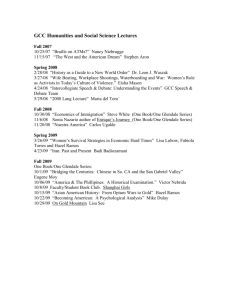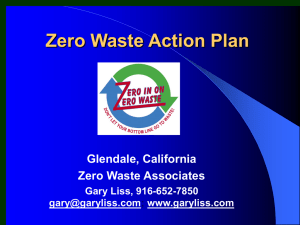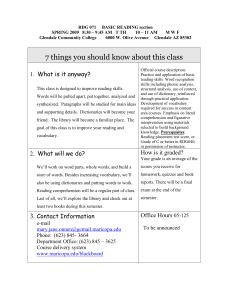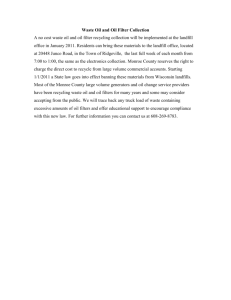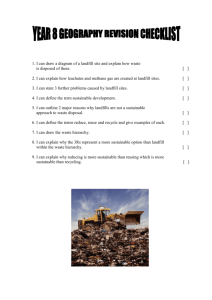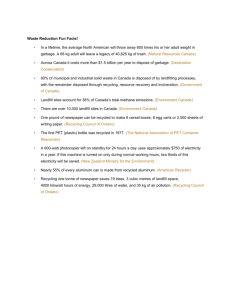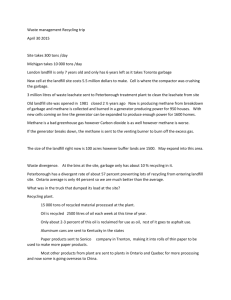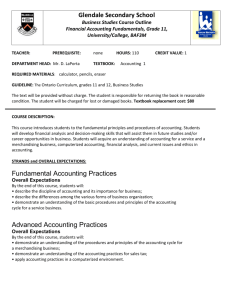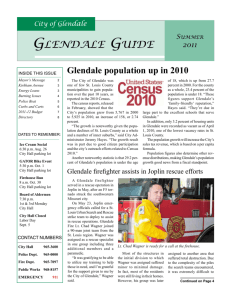Glendale Zero Waste Action Plan Report
advertisement
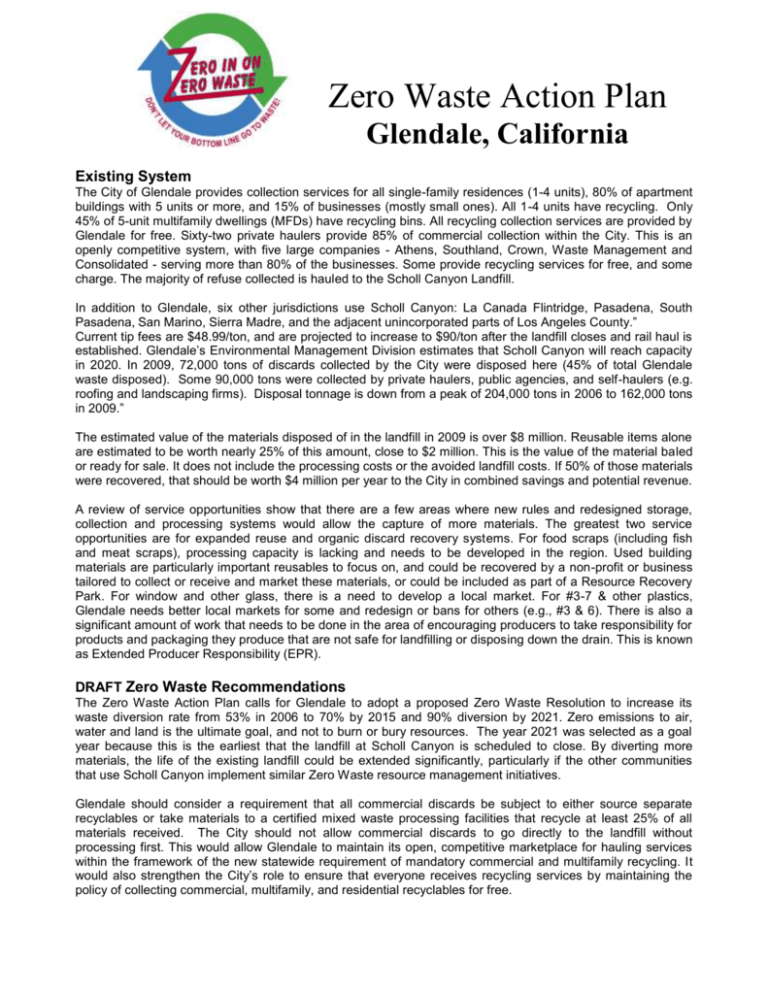
Zero Waste Action Plan Glendale, California Existing System The City of Glendale provides collection services for all single-family residences (1-4 units), 80% of apartment buildings with 5 units or more, and 15% of businesses (mostly small ones). All 1-4 units have recycling. Only 45% of 5-unit multifamily dwellings (MFDs) have recycling bins. All recycling collection services are provided by Glendale for free. Sixty-two private haulers provide 85% of commercial collection within the City. This is an openly competitive system, with five large companies - Athens, Southland, Crown, Waste Management and Consolidated - serving more than 80% of the businesses. Some provide recycling services for free, and some charge. The majority of refuse collected is hauled to the Scholl Canyon Landfill. In addition to Glendale, six other jurisdictions use Scholl Canyon: La Canada Flintridge, Pasadena, South Pasadena, San Marino, Sierra Madre, and the adjacent unincorporated parts of Los Angeles County.” Current tip fees are $48.99/ton, and are projected to increase to $90/ton after the landfill closes and rail haul is established. Glendale’s Environmental Management Division estimates that Scholl Canyon will reach capacity in 2020. In 2009, 72,000 tons of discards collected by the City were disposed here (45% of total Glendale waste disposed). Some 90,000 tons were collected by private haulers, public agencies, and self-haulers (e.g. roofing and landscaping firms). Disposal tonnage is down from a peak of 204,000 tons in 2006 to 162,000 tons in 2009.” The estimated value of the materials disposed of in the landfill in 2009 is over $8 million. Reusable items alone are estimated to be worth nearly 25% of this amount, close to $2 million. This is the value of the material baled or ready for sale. It does not include the processing costs or the avoided landfill costs. If 50% of those materials were recovered, that should be worth $4 million per year to the City in combined savings and potential revenue. A review of service opportunities show that there are a few areas where new rules and redesigned storage, collection and processing systems would allow the capture of more materials. The greatest two service opportunities are for expanded reuse and organic discard recovery systems. For food scraps (including fish and meat scraps), processing capacity is lacking and needs to be developed in the region. Used building materials are particularly important reusables to focus on, and could be recovered by a non-profit or business tailored to collect or receive and market these materials, or could be included as part of a Resource Recovery Park. For window and other glass, there is a need to develop a local market. For #3-7 & other plastics, Glendale needs better local markets for some and redesign or bans for others (e.g., #3 & 6). There is also a significant amount of work that needs to be done in the area of encouraging producers to take responsibility for products and packaging they produce that are not safe for landfilling or disposing down the drain. This is known as Extended Producer Responsibility (EPR). DRAFT Zero Waste Recommendations The Zero Waste Action Plan calls for Glendale to adopt a proposed Zero Waste Resolution to increase its waste diversion rate from 53% in 2006 to 70% by 2015 and 90% diversion by 2021. Zero emissions to air, water and land is the ultimate goal, and not to burn or bury resources. The year 2021 was selected as a goal year because this is the earliest that the landfill at Scholl Canyon is scheduled to close. By diverting more materials, the life of the existing landfill could be extended significantly, particularly if the other communities that use Scholl Canyon implement similar Zero Waste resource management initiatives. Glendale should consider a requirement that all commercial discards be subject to either source separate recyclables or take materials to a certified mixed waste processing facilities that recycle at least 25% of all materials received. The City should not allow commercial discards to go directly to the landfill without processing first. This would allow Glendale to maintain its open, competitive marketplace for hauling services within the framework of the new statewide requirement of mandatory commercial and multifamily recycling. It would also strengthen the City’s role to ensure that everyone receives recycling services by maintaining the policy of collecting commercial, multifamily, and residential recyclables for free. The Plan also suggests policies to get all compostable organics out of landfills, Once processing capacity is developed, Glendale could include in its Mandatory Recycling Ordinance (MRO) the provision to keep “wet” discards (which include yard trimmings, food scraps and soiled paper, manure and other “putrescibles”) separate from “dry” discards. Wet discards would be collected for processing through composting (and possible energy generation) and dry products and materials would be reused, repaired or recycled. Glendale could also require all landscapers working in the City to use the designated composting site once developed and operational. Whether required or not, delivering landscape debris to the compost facility rather than the landfill could be incentivized through establishment of a fee that is less than the cost of landfilling. As over half of the remaining materials being landfilled are compostable, aggressively pursuing this organics strategy and a Mandatory Commercial Recycling program will allow the City to divert more than 70% of its total discard stream from landfills by 2015. Source reduction and highest and best organic discard processing programs such as composting can divert two-thirds of compostable materials from the landfill, and these organics initiatives combined with an MRO will divert one-third of discarded paper (food-soiled and dry). These capture rates are estimated to reduce landfilling by about 26,000 tons per year from food scraps and 27,000 tons per year from all paper. Other communities, such as San Francisco, that have implemented such programs, have already achieved over 75% diversion. Glendale is already a member of the California Product Stewardship Council. Adoption of an EPR resolution is a critical next step in protecting public health and reducing resource management costs and liabilities by phasing out toxic and disposable products. A Glendale EPR resolution could: Establish a preference for take-back provisions in purchasing contracts Specify a range of problem products to investigate for local actions Call on state government to pass producer responsibility legislation Many communities in Los Angeles County have already adopted such resolutions. Glendale could also compile a list and publish it on its website of businesses or non-profits that will take back products and packaging from customers that are otherwise difficult to reuse, recycle or compost locally. The City could also join other local communities in the area to adopt local take-back policies and programs for problematic materials such as implementing a citywide ban on stores distributing free single-use plastic shopping bags. Benefits to Glendale from adopting this Zero Waste Plan include: Reduced Costs for Residents and Businesses – All Zero Waste businesses that have been documented have saved money. Pay as you throw programs and other incentives result in residents saving money by reducing waste and recycling more. Costs Gradually Shifted out of the Community – As EPR programs are implemented, costs for Household Hazardous Waste Management will be shifted from public agencies to manufacturers, first importers, brandowners and retailers. Reduced Liabilities – Every ton buried in a landfill remains the responsibility of the generator, under Federal Superfund law. If there are any problems with the landfills used (e.g., from leaks of gas or liquids), the attorneys involved will send a bill to everyone who ever used that facility, proportionate to the amount generated. This will affect most communities with regard to all residential discards and for commercial discards if the communities assume responsibility for those discards in directing exclusive contracts. Increased Efficiency – When sustainability audits are conducted for businesses documenting all the energy, materials and products they buy to create their own products, they find that nationally only 6% is used for producing products, and 94% is wasted. For communities that pursue Zero Waste, they will help their businesses become more efficient and sustainable. Improved Green Commitment – This is of increasing importance to communities and elected officials. To stay informed and share progress on moving towards Zero Waste, join the Zero Waste Glendale Yahoo Group: http://groups.yahoo.com/group/ZeroWasteGlendale For questions: Contact Tom Brady, City of Glendale, 818-550-3435, tbrady@ci.glendale.ca.us. This Plan was prepared by Zero Waste Associates, a partnership of Richard Anthony Associates and Gary Liss & Associates with support from Hidden Resources and Earth Resource Foundation
